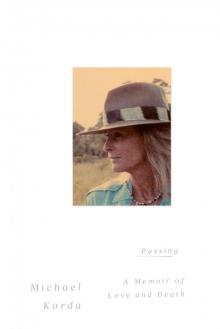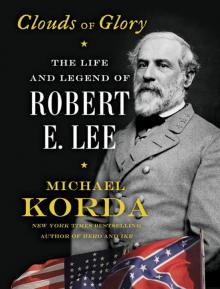- Home
- Michael Korda
Hero Page 15
Hero Read online
Page 15
Sarah Lawrence, who would present Thomas Chapman with five sons, of which T. E. Lawrence was the second, lived until 1959, dying at the age of ninety-eight. She was, even in her youth, a woman of firm principles and amazing determination. Her most famous son, T. E. Lawrence, spent a lifetime trying to fathom his relationship with his mother, and never quite succeeded. He saw in her much of himself—one friend of his (a woman) remarked, “T. E. got his firm chin and the piercing blue eyes from his mother, his strength of character and ability to martyr himself in the desert. She had those martyr qualities She forced herself.” Lawrence himself would write of Sarah, “No trust ever existed between my mother and myself…. I always felt that she was laying siege to me, and would conquer, if I left a chink unguarded.” Almost everybody who met Sarah commented on the intensity of her personality, and on her indomitable will, as well as her refusal to compromise on most moral issues.
Sarah’s unflinching sense of right and wrong and her moral certainty were no doubt made a more painful burden for her by the fact that she not only bore Thomas Chapman five illegitimate sons—for his wife would never agree to a divorce—but was illegitimate herself, as her own mother had been. Sarah was born in 1861, in the north of England; her birth name was Junner, and her mother, Elizabeth Junner, had been a servant in the household of an insurance surveyor, Thomas Lawrence, in Sunder-land, County Durham. A case has been made, very convincingly, that Sarah was the child of “Thomas Lawrence’s eldest son, John,” and this certainly does seem possible—it is a reflection of a well-known social problem during the Victorian age, when female servants were often made pregnant by the master of the house (as was the case with Sarah) or by one of his sons (as was apparently the case with her mother). Almost invariably in such circumstances, the young woman paid the price, being sacked without a letter of reference, and the illegitimate babies that resulted often ended up in orphanages.
Elizabeth Junner apparently died of alcoholism (not an uncommon fate for such women). Her daughter Sarah seems to have been taken in by a grandfather and to have spent her childhood in Spartan conditions on his farm in Perthshire, Scotland, where she had to walk six miles back and forth to school five days a week. The death of her grandmother made it necessary to place Sarah in the care of an aunt, who may have been the servant of the rector of “a low church” parish. Sarah spent several unhappy years there, subjected to a strong and unforgiving religious upbringing, apparently unalleviated by any warmth or affection. Typically of Scotland, she received a good education, however. At some point she was sent to Skye, an island of bleak and barren beauty, where she may have done housework; and at the age of eighteen she was selected by the agent for the Chapman estate, who had been searching for a reliably Protestant Scottish nanny or governess to look after the Chapmans’ daughters. Sarah shortly journeyed to Ireland to join the household at South Hills, with consequences we already know. She seems to have adopted the surname Lawrence along the way, borrowing it no doubt from whatever her mother had told her about the man who had been her father; but like her son T. E. Lawrence she changed her surname often, and on the birth certificates of her sons she is variously identified as “Sarah Chapman (formerly Laurence) [sic],” “Sarah Maden,” and “Sarah Jenner.” Some of this variation may be due to inattention or careless spelling by busy clerks, but it is still unusual, and perhaps reveals a certain anxiety about her ambiguous position as an unmarried mother.
In an age when reliable contraception was largely unavailable, illegitimacy was a widespread consequence of placing young single women as domestic employees in large households, where they were exposed to temptation and were at the mercy of their employers or older male servants; hence, the housemaid “in the family way” is a stock figure in Victorian melodrama and music hall.
Unlike her mother, Sarah Junner managed to create a better life for herself by the sheer strength of her personality and her good education. It may be that once she was fired, Thomas Chapman’s first instinct had been to keep her in lodgings in Dublin and visit her on his frequent trips there. If so, he underestimated her determination, and perhaps also the strength of his feelings for her. In the event, he continued living at home and visiting Sarah in Dublin until their son Montagu Robert (always known in the family as “Bob”) was born in December 1885. It was only then, when they were already illicit parents, that they were observed by a servant, and that Edith Chapman confronted her husband.
It is testimony to Sarah’s strength of character that Thomas Chapman not only gave up his own name but also adopted for himself what he assumed was Sarah’s surname. He did not do this by deed poll or any other legal document—he simply started calling himself Lawrence, and that was that. It is not clear whether he took the name voluntarily, or whether this was one of Edith’s demands for their separation, but in any case changing his name does not seem to have bothered him. Between Sarah’s various surnames and Thomas’s change of name, it is hardly surprising that T. E. Lawrence found it so easy to adopt different names for his own service in the army and the RAF.
In 1885 the modern need for official documents about one’s identity hardly existed. There were of course no computers, no credit cards, and no driver’s licenses; the idea of attaching a photograph to a document was still in its infancy; birth and death certificates were more likely to be kept in parish archives than in government files, and were therefore subject to the perils of poor spelling, bad handwriting, hearsay evidence, and a pious concern to tidy up the written record and gloss over small human failings among the parishioners.
Still, even under his new name, Thomas Lawrence could hardly expect to go unnoticed in a small city like Dublin in the 1880s. The scandal of his departure from home certainly was public knowledge. A shopkeeper in Delvin said many years later that from the moment of Thomas’s departure, Edith refused to “go out in society,” and fell back on the support of her numerous relatives.
Perhaps inevitably, the newly named Lawrence family soon took up a rootless and wandering existence outside Ireland, in remote places where Thomas was unlikely to be recognized. First they moved to the village of Tremadoc, in Carnarvon, North Wales, where Sarah gave birth to their second child, Thomas Edward Lawrence, on August 16, 1888; then to a house in Kirkcudbright, Scotland, where Sarah gave birth to their third son, William George, in December 1889; then briefly to the Isle of Man, then to Saint Helier in Jersey, in the Channel Islands; then to Dinard, a seaside resort in Brittany, where there were many English visitors and residents—perhaps too many, for they moved again, first to a rented house on an estate in New Forest, in Hampshire, and finally to a large, comfortable redbrick house of their own in Oxford, at 2 Polstead Road.
A photograph taken of Sarah with four of her sons (Arnold was not yet born) in the summer 1894 at Langley Lodge, in the New Forest, is interesting. First, the picture shows Sarah in an elegant ruffled blouse and a fashionably tight skirt, holding baby Frank, and makes it clear that despite giving birth to four children she still had a remarkably trim figure and a tiny waist, as well as a very pretty face. Second, the house looks rather grand, with big columns on the porch, and carefully tended greenery. The boys look healthy, are blond, and are all dressed in sailor suits, with straw hats. Next to Ned’s bare knees sits an alert small dog, apparently a terrier, its doubts about being photographed mirrored by the expression on Ned’s face. The boys’ little shoes are brightly polished—evidence, one suspects, of a nanny or maid behind the scenes hard at work. It does not look exactly like the penurious background that the grown-up T. E. Lawrence describes when writing about his childhood; and judging from the expression on Sarah’s face it rather bears out his rare, and somewhatbaffled, admiring description of his parents’ relationship as “a real love match.”
Although Thomas Chapman—now Thomas Lawrence—had left behind most of his wealth, he received a modest but comfortable yearly income, and had some limited access to capital—they were by no means penniless exiles. What is more, there was
a certain pattern to their moves. All these places were near enough to Ireland to make it easy for Thomas to go back to Dublin on “family business” connected with the estate when necessary; and the Isle of Man, the Channel Islands, and Dinard were well placed to give him the maximum opportunity to indulge his love of sailing. The eventual move back to England, first to a house in Hampshire, then to one in suburban Oxford, reflects both a concern that if one of their boys was born in France he would become subject to military service there, and a desire to have the boys educated at home in their own language. By the time they reached Oxford in 1896, they had four children: Bob, Ned, Bill, and Frank. (The fifth boy, Arnold, was born in Oxford in 1900. In addition, Sarah gave birth to three other sons, two stillborn and one who lived for only a few hours.)
If one reason for the deterioration of the Chapmans’ marriage was that Edith Chapman produced four girls in succession and no son, Thomas can only have been satisfied by his decision to leave her for Sarah, who bore him eight boys, of whom five lived and thrived. In fact, by all accounts, Thomas, though not an ebullient personality, seems to have become far more cheerful than he had been when he was living with Edith. He enjoyed the company of his sons, and was anything but remote or diffident where they were concerned; indeed no detail of what they were doing seems to have been too small to interest him, and his letters to them when they were older are models of a what a parent’s letters ought to be—full of practical advice and commonsense suggestions, as well as letting the boys, particularly Ned, explore their own limits without nagging or scolding. Thomas remained an enthusiastic shot, though now on a smaller scale, having given up his estates, and he taught the older boys to shoot well, although they did not share his enthusiasm for shooting gamebirds. He also taught them how to sail, enjoyed bicycling with them, conveyed to them his own skill at carpentry and photography, and imparted, at least to Ned, his interest in church architecture. In an age when upper-class parents were often distant, and left the upbringing of their children to nannies and tutors, he was quite the reverse, deeply involved in everything they did.
There is no doubt that Sarah was the driving force in the family, however. She was always in motion, a whirlwind of energy, the family disciplinarian. People who did not know her well thought her “overpowering and terrifying,” and she pushed her sons relentlessly and ruled their lives with alarming strictness. Many who met Sarah found her charming, but her blunt outspokenness and fiercely held opinions could also be disconcerting to strangers. On the other hand, since these are exactly the characteristics that the English admire in the Scots, and that the Scots themselves believe set them apart from the distant politeness and hypocrisy of the English, the wiliness of the Welsh, and the charm-laden duplicity of the Irish, many people found this side of Sarah endearing too.
T. E. Lawrence himself, even when he was older and a national hero, still found his mother terrifying, and as soon as he could, he carefully arranged his life to see as little of her as possible. From the beginning, he seems to have attracted her attention like a lightning rod, unlike the other boys. During the war, Auda Abu Tayi would refer to Lawrence as “the world’s imp,” and impishness seems to have been a permanent part of his character even when he was an infant—certainly his mother seems to have come down much harder on him than on his brothers, for naughtiness, disobedience, and a general failure to live by her strict and unforgiving rules.
Against this picture of Sarah as a domestic tyrant is the fact that the Lawrences were in their own way a happy family,* in which both parentsarranged their lives around the needs of their children—although to a degree that may, at any rate to Ned, often have felt suffocating. Thomas Lawrence had no work or job, and apart from his infrequent visits to Dublin on “family business” and his occasional day in the field with a few shooting companions, he was often at home. Sarah, with or without “help,” was a constant presence, cleaning, tidying, polishing, and keeping the whole household up to her very high standards of perfection. They must have made an odd-looking couple: he very tall, courtly, stooped, and thin; she tiny, much younger, and continuously in motion. Socially, they were even odder, by turn-of-the-century English standards. Thomas was, despite his change of name, recognizably a member of the upper class, in the way he dressed, in his speech, and in his polite but detached relationship to workmen and others of “the lower classes.” Sarah’s accent was unmistakably Scottish; her firm, direct way of dealing with people was very different from his; and she was comfortable with members of what was then still called “the working class.” People who met them instantly thought that there was something strange about them as a couple, a mismatch between the languid politeness of the Old Etonian and the alarming energy of the former governess. Some even noticed that Sarah never referred to Thomas as “my husband,” but instead always spoke of him as “Mr. Lawrence,” or “the boys’ father.”
Though in later life T. E. Lawrence would remark, half in complaint, half in admiration, that his parents lived on a “workman’s salary” of not more than £400* a year, and had to pinch pennies to make ends meet with five sons, in fact they seem to have lived comfortably enough, and not to have wanted for anything. Doubtless it was a big step down in income for a man who had been born to considerable wealth, but in late Victorian and Edwardian England £400 a year was the income of a member of the middle or “professional” class, not of a workman, and its current equivalent would be at least $100,000, if we bear in mind that in 1890 taxation was very low. It is also clear enough that from time to time Thomas Lawrence had access to capital: hence his ability to buy bicycles for his sons and himself, to continue sailing and shooting, and to fund Ned’s bicycling tours in France and a walking tour in Syria when Ned was older. On the other hand, Sarah was certainly always aware of the need to scrimp and save—it was part of her character, implanted by her own impoverished childhood.
T. E. Lawrence would inherit both parents’ attitudes toward money: on the one hand, like his mother, he reduced his expenses to the absolute minimum; but like his father’s, his attitude toward money was “lordly” when it came to things like his custom-made Brough motorcycles (the Brough was a two-wheeled equivalent of a Rolls-Royce). He spent a fortune by any standards paying artists to do the paintings and the drawings for Seven Pillars of Wisdom, and having the copies individually bound in leather by the finest bookbinders in England. His generosity to friends was lavish to the point of impoverishing himself.
Naturally, the elder Lawrences’ lives were conditioned to a certain degree by the need to maintain their secret, but that apparently did not prevent them from having friends, from going out, or from having visitors—indeed everybody who knew them remarked on what good company the Lawrences were. During the years when they lived in Dinard, they had many friends among the British residents—the area around Dinard, in Normandy, was an inexpensive place for Britons to live or retire—and the family of their landlord, the Chaignons, not only became friends, but would maintain the contact when the boys were grown up.
The same was true during the time the Lawrences spent in the New Forest, when Bob, Ned, and Will had many friends, one of whom, Janet Laurie, would be a friend of Ned’s for life—so far as we know the only girl to whom he ever proposed marriage. This was the case in Oxford too. The “isolation” of the Lawrence family has certainly been exaggerated, especially when it came to the friends of the boys, who were constantly in and out of the house.
The eventual choice of Oxford was sensible, both because it offered excellent opportunities for education—the parents were determined to give the boys the best possible education—and because in a university town, which was essentially middle-class, there were fewer people who would have heard their story, or who might recognize Thomas Lawrence as Thomas Chapman. In London, by contrast, the story of Thomas Chapman’s running off with his daughters’ governess was well known among people of his class, a kind of scandalous object lesson in how not to conduct an affair; he would certainly
have been recognized at his club, whereas in Oxford he could use the Oxford Union as a club without being bothered—the dons, wrapped up in their own insular world, were unlikely to have heard the gossip about him, or to care.
Another reason for choosing Oxford was that it was then a lively religious center. Sarah’s religious feelings had always been strong, and they grew stronger still as she took on herself the responsibility for the sin of breaking up Thomas’s marriage and giving him five illegitimate children. She was not a religious zealot like Edith Chapman, but she wanted a place to bring up her children in a religious atmosphere, and Oxford certainly was that. Hardly a day passed in Oxford without the sound of choral singing, organs, and bells somewhere. Not that Sarah was a High Church Anglican, or would have approved of the pomp and circumstance of religion as it was practiced at the university. She was a strict follower of the evangelical movement, and attended Sunday service at St. Aldates Church, in the center of Oxford, planted firmly opposite Christ Church College and Cathedral, in stubborn opposition to High Anglicanism, with its “Roman” rites and elaborate services. The evangelicals, or Low Church Anglicans, then as now, preferred simpler services, emphasized the personal relationship between the communicant and Jesus, and believed that the Bible should be taken literally. The Lawrence family met for prayers and Bible reading every morning before the older children left for school, as well as on Sundays, with the boys kneeling beside their father as he led the service, and he or Sarah read aloud to them from the Bible.
Of course this kind of religious home life was more common in the late Victorian era than it is now, but even by late Victorian standards religion played a large role in the lives of the Lawrence family, and was certainly a bond between Sarah and Thomas. She was fervent in her belief, and Thomas seems to have been too, though in the polite and unobtrusive manner of his class. He was a gentleman in religion as in everything else, whereas Sarah was consumed by a need to save him, to compensate by the intensity of her faith for the sin into which she had led him, and to atone for it by ensuring that her sons’ religious feelings were as strong as her own. To some extent, she succeeded—her eldest son, Bob, would eventually accompany her to China as a missionary; Frank and Will seem to have retained throughout their short lives a certain degree of religious feeling. But Arnold was much less religious; and with her second son, Ned, she failed completely, and therefore, throughout his life, fought all the harder to save him.

 Passing
Passing Another Life
Another Life Clouds of Glory
Clouds of Glory Hero: The Life and Legend of Lawrence of Arabia
Hero: The Life and Legend of Lawrence of Arabia Cat People
Cat People Hero
Hero With Wings Like Eagles: A History of the Battle of Britain
With Wings Like Eagles: A History of the Battle of Britain Ulysses S. Grant
Ulysses S. Grant